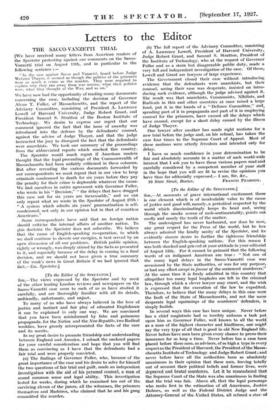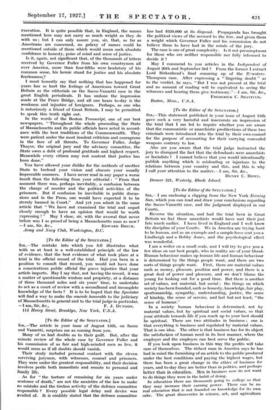[To the Editor of the SPECTATOR.]
SIR,—At moments of grave international excitement there is one element which is of incalculable value to the cause of justice and good will, namely, a periodical respected by the world which discriminatingly keeps its head and, seeing through the smoke screen of mob-sentimentality, points out coolly and sanely the truth of the Matter.
The undersigned has never harboured, nor does he nov4 any great respect for the Press of the world, but he has always admired the kindly sanity of the • Spectator, and its evidently sincere desire to further the righteous friendship between the English-speaking nations. For this reason I was both shocked and grieved at your attitude in your editorial of August 13th. For it cannot be gainsaid that the following words of an indignant American are true : "Not' one of the many legal delays in the Sacco-Vanzetti case was occasioned by the State authorities, or was for any purpose, or had any effect except in favour of the sentenced murderers." At the same time it is freely admitted in this country that altogether too many legal loopholes are left in the criminal law, through which a clever lawyer may crawl, and the -wish is expressed that the execution of the law be expedited: Therefore, to believe that the many delays in this case 'were the fault of the State of Massachusetts, and not the mere desperate legal squirmings of- the murderers' defenders, is simply foolish.
In several ways this case has been unique. Never before has a chief magistrate had so terribly arduous a task put upon him as Governor Fuller, well known to all the world as a man of the highest character and kindliness, one might say the very type of all that is good in old New England life: Never before have men been given every chance to prove their ismocence for so long a time. Never before has a case been placed before three men, as advisers, of so high a type in every respect as the President of Harvard, the President of the Massa- chusetts Institute of Technology• and Judge Robert Grant ; and never before have all the authorities been so absolutely unanimous in their opinion that these men, -leaving totally out of account their political beliefs and former lives, were
depraved and brutal murderers. Let it be remembered that
the Supreme Court of the State was also unanimous in finding that the trial was fair. Above all, that the legal personage who ranks first in the estimation of all Americans, Justice Holmes, as well as the Federal District Judge and the Attorney-General of the -United States, all refused a sta.-v-9* execution. It is quite possible that, in England, the names mentioned here may not carry as much weight as they do with us ; but I can only assure you, sir, that, so far as Americans are concerned, no galaxy of names could be mentioned outside of them which would mean such absolute confidence in honesty, poise of mind and sense of justice.
Is it, again, not significant that, of the thousands of letters received by Governor Fuller from his own countrymen all over America, more than four-fifths were laudatory of his common sense, his heroic stand for justice and his absolute fearlessness?
I must honestly say that nothing that has happened for years has so hurt the feelings of Americans toward Great Britain as the editorials on the Sacco-Vanzetti case in the great English periodicals. It has undone the impression made at the Peace Bridge, and all one hears to-day, is the weakness and injustice of foreigners. Perhaps, as one who is notoriously a friend of Great Britain, I may be permitted to, speak this truth right out.
In the words of the Boston Transcript, one of our best newspapers, "Throughout the whole proceeding the State of Massachusetts and its public officials have acted in accord- ance with the best traditions of the Commonwealth. They were patient under the most insolent criticism and courageous in the face of all threats. To Governor Fuller, Judge Thayer, the original jury and the advisory committee, the State owes a debt of profound gratitude and highest respect. Meanwhile every citizen may rest content that justice has been done."
• You have allowed your dislike for the methods of another State to becloud your vision and obscure your usually impeccable manners. I have never read in any paper a worse insult than the following from your editorial : "From that moment there was, perhaps inevitably, a confusion- between the charge of murder and the political activities of the prisoners. But if confusion be inevitable in public discus- sions and in the Press, one would have expected it to be sternly banned in Court." And yet you admit in the same article that "We have not examined the trial and sequel closely enough to have an opinion that would be worth expressing ! " May I close, sir, with the avowal that never before was I so proud of being a Massachusetts man as now?















































 Previous page
Previous page